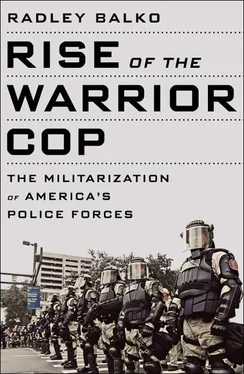In an interview with PBS thirty years later, Egil Krogh described the glee in the White House once ODALE was up and running.
There was a tremendous amount of zeal behind what we were doing, too. The people that worked on these programs came to work each day saying, “What can we do today?” It was a very exciting atmosphere. It was a place where I look back with a fierce affection of what we were able to do that I thought was effective. I regret the mistakes that we made, but we really tried our hardest. 65
Those mistakes quickly began to add up. The strike force that carried out the Collinsville raids hadn’t even bothered to get a search warrant before storming the Giglotto and Askew homes. Ambrose called the mistakes “reprehensible” and attributed them to “stupidity,” but quickly added, “Drug people are the very vermin of humanity. They are dangerous. Occasionally we must adopt their dress and tactics.” The agents in Collinsville were suspended pending further investigation—with pay. 66
In what would for the next forty years become a standard line from law enforcement officials, Ambrose also called the Collinsville raids “a very isolated situation.” 67That would become increasingly difficult to believe. Two months later, another victim of the same Collinsville strike force came forward. Twenty-seven-year-old John Meiners of Edwardsville, Illinois, had been raided three days before the raids on the Askews and the Giglottos. He got it even worse. At about 3:00 AM, the armed narcs broke in. He awoke and got out of bed, only to be pinned against the wall with a gun to his head. They then tore his house apart. They smashed up windows even after they had already made their way inside. They “confiscated” his stereo, golf clubs, shotgun, and camera. Meiners himself was arrested, taken to a police station, and held for seventy-seven hours. They wouldn’t even let him call his family, much less an attorney. After three days, they let him go with no explanation. And once again, they had no warrant. 68
By the following August, investigators discovered three additional warrantless raids by the same ODALE strike force at about the same time, bringing the total to six such raids over a five-day span. In the first raid, on April 19, police broke into an East St. Louis home and handcuffed resident Robert Underwood to a chair. One agent then beat him while another held a gun to his head. The next day three agents raided the home of Rev. Karol Rekas. On April 23, the same day as the Askew and Giglotto raids, five agents raided the East St. Louis home of Mr. and Mrs. George Juengel, neither of whom were home at the time. 69
Three months after those raids, in 1972, the New York Times published the results of its own investigation into the use of aggressive drug raids. The paper found that “dozens” of botched raids had occurred across the country since the 1970 federal crime bills and similar bills in the states became law. Agents, “often acting on uncorroborated tips from informants,” were “bashing down the doors to a home or apartment and holding the residents at gunpoint while they ransack the house.” The paper found that the botched raids were usually on lower-class families and were “tied intimately to the veritable explosion of government drug enforcement activities in recent years,” thanks to Nixon’s “total war” on drugs. Some victims told the paper that they hadn’t come forward because narcotics officers had threatened them. Others had remained silent because “in their hatred for drugs they condoned the tactics but not the specific incidents.” 70Two weeks earlier, the Associated Press published its own investigation, which came to similar conclusions. 71Little of this seemed to faze Ambrose. Within weeks of the Collinsville raids, he increased the number of strike forces from thirty-eight to forty-one. 72
Between April 1972 and May 1973, ODALE strike forces conducted 1,439 raids. It’s unclear how many were knock-and-announce and how many were no-knock, but even by 1973 the difference between the two kinds of raids had already begun to blur. “You might whisper ‘Police! Open up!’” one agent told the Times . “Or you could yell it the instant before you hit the door.”
Nixon’s dehumanization and demonization of drug offenders had been a (literally) smashing success. Tactics like these had rarely been used in the United States, even against hardened criminals. Now they were being used against people suspected of nonviolent crimes, and with such wanton disregard for civil rights and procedure that the occasional wrong door or terrorized family could be dismissed as “an insignificant detail” or as cops “just trying to do their job.” Even when acknowledging their mistakes, as Ambrose did, officials could minimize the horror—at least in their own minds—with context. These men were rounding up “the very vermin of humanity,” after all. Surely the country understood that some collateral damage would be inflicted in the process.
The tactics could be degrading for the agents too. One ODALE agent told the Times, “Your whole lifestyle changes, and perhaps your morals too. Sometimes there’s a thin line between the hunted and the hunter.” Another agent described what he and his colleagues were thinking just before a raid:
You have to go in with the idea that [the suspect is] going to fight. He’s always being shaken down by other pushers. So you figure you’ll be staring down a gun barrel. I’ve been on 200 or so raids, and the no-knock is the scariest. You ask yourself what would you do if your door came crashing down at 3 am and you had a gun. You’d let go, right? Personally, I think the danger might outweigh the value. 73
By July, there was some momentum to end the raids and, since Watergate had broken, some momentum against the White House in general. Under the sunset provision, ODALE was about to expire, and Ambrose was planning to leave when it did. He still remained defiant, making no guarantee that the botched raids wouldn’t continue. “I can’t tell you that in the future there wouldn’t be some knuckleheads who might go off half-cocked on their own to conduct raids,” he said. 74He seemed oblivious to—or simply untroubled by—the possibility that as leader of ODALE his own tone and rhetoric might have been part of the reason for the outbreak of knuckleheadery and half-cockedness in the first place.
With the expiration of ODALE, the Nixon administration consolidated all of the federal government’s drug enforcement agencies into one, which would be called the Drug Enforcement Administration (DEA). It would remain in the Justice Department, again putting more cops under the same department that oversees federal prosecutors. 75
The DEA’s new director, John Bartels Jr., took a much more conciliatory approach than Ambrose to the problem of botched raids. In July 1973, then as acting DEA administrator, Bartels declared that any future mistakes “would not be tolerated.” He issued a new set of guidelines, the most significant of which required that either Bartels himself or his deputy sign off on every no-knock raid carried out by the agency. He also required DEA agents to obtain an arrest warrant “whenever humanly practical” before making a forced entry into a private residence. Previously, they had needed only a search warrant, which could have listed only a residence instead of the name of the resident. The new policy would make it more difficult to wantonly break down doors based on no more than an informant’s tip that he had bought or seen drugs in a particular residence.
To clarify the distinction between no-knock and knock-and-announce raids, Bartels added more instruction for the latter: “Before entering any premises, the agent will knock and announce his purpose and authority in an audible and distinctive matter.” Agents would then have to pause and wait to be denied admittance before attempting a forcible entry. Bartels would require DEA agents to wear distinctive clothing that identified them as federal law enforcement, and they were explicitly forbidden from firing a weapon “except in self-defense or in the defense of another person.” He also created a full-time position whose only responsibility was “to personally ensure that all operations are conducted in a completely legal and professional manner.” The first person to fill that position, former BNDD official John Enright, would visit every field office in the country to train drug agents on the new guidelines. 76
Читать дальше












